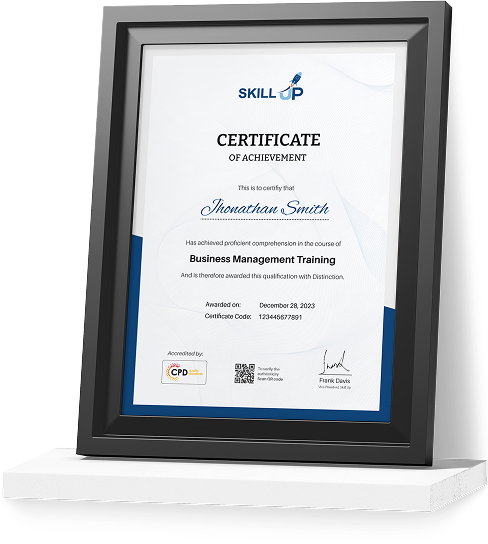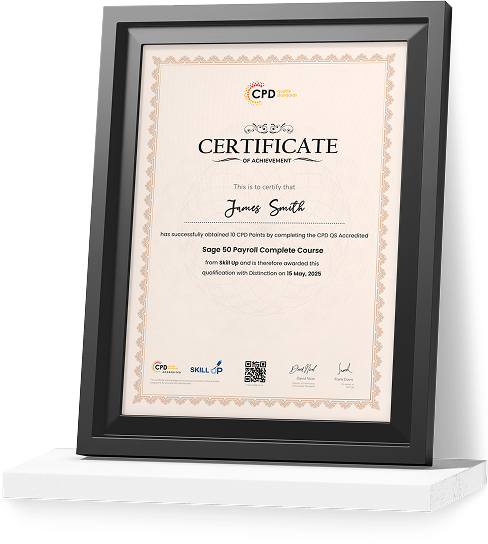 Quality Management and Strategic Course- ISO 9001
Quality Management and Strategic Course- ISO 9001
Quality Management and Strategic Course – ISO 9001 introduces learners to globally recognised standards for quality assurance and organisational improvement. This ISO 9001 course online provides a detailed overview of quality management principles, performance evaluation, and the process approach essential for maintaining consistency and customer satisfaction. Through this ISO 9001 training online, participants explore the context of the organisation, quality objectives, and strategic integration methods that align business operations with compliance. Designed for those pursuing excellence, this ISO 9001 course in the UK sets a strong foundation for professional growth and organisational credibility.
 Course Description
Course Description
Quality is not merely a standard—it is a strategy for success. The Quality Management and Strategic Course – ISO 9001 is designed to help learners comprehend how structured quality systems drive efficiency, trust, and performance across organisations. This ISO 9001 course online brings clarity to the fundamental definitions, principles, and responsibilities within ISO frameworks.
Participants will explore the major changes in ISO standards, quality management principles, and tools that support continual improvement. Through interactive study materials, the ISO 9001 training courses UK allow learners to understand the connection between quality objectives and business performance. The course further emphasises the process approach and how it contributes to an organisation’s context and competitive advantage.
Completing this ISO 9001 auditor course online equips individuals with essential insights into implementing, managing, and evaluating quality management systems. Whether pursuing a leadership role or seeking certification readiness, this ISO 9001 online course provides the strategic direction to elevate quality operations in any sector.
 Learning Outcome
Learning Outcome
- Identify and interpret the key requirements of ISO 9001 and their impact on organisational structure.
- Apply quality management principles to develop effective performance evaluation strategies.
- Analyse the process approach to improve efficiency and reduce operational risks.
- Establish and monitor quality objectives aligned with strategic business goals.
- Utilise ISO 9001 tools to maintain compliance and support continuous improvement initiatives.
 Who Is This Course For?
Who Is This Course For?
- Professionals seeking ISO 9001 certification or auditor qualifications.
- Managers aiming to implement ISO 9001 standards in their organisations.
- Quality assurance officers looking to enhance compliance procedures.
- Business owners focused on improving customer satisfaction and operational quality.
- Individuals pursuing careers in quality management within the UK.
 Certificate of Achievement
Certificate of Achievement
Earn Your Accredited Certificate with Transcript
Save 20% with the coupon code SKILL20

Show Your Certified Identity with a CPD-QS Certificate
Perfect for employers, clients, or academic verification.

 Career Path
Career Path
- Quality Manager – Oversees quality systems and compliance processes within organisations. Average salary: £55,000 – £80,000 per year.
- ISO 9001 Lead Auditor – Conducts internal and external audits for certification bodies. Average salary: £50,000 – £75,000 per year.
- Compliance Officer – Ensures adherence to ISO standards and internal policies. Average salary: £45,000 – £65,000 per year.
- Quality Assurance Consultant – Advises companies on ISO 9001 frameworks and improvements. Average salary: £60,000 – £85,000 per year.
- Operations Excellence Specialist – Implements strategies for continual improvement and efficiency. Average salary: £48,000 – £70,000 per year.
- Business Improvement Manager – Aligns quality initiatives with organisational strategy and performance. Average salary: £52,000 – £78,000 per year.
 Frequestly Asked Questions
Frequestly Asked Questions
ISO 9001 is an internationally recognised Quality Management System (QMS) standard that ensures organisations deliver consistent products and services that meet customer and regulatory requirements. In the UK, implementing ISO 9001 helps businesses improve operational efficiency, customer satisfaction, and competitive advantage in both local and global markets.
ISO 9001 aligns quality objectives with an organisation’s strategic goals. It promotes data-driven decision-making, risk management, and continuous improvement — all of which are essential for sustainable growth. Many UK companies use ISO 9001 to enhance leadership engagement and integrate quality into their overall business strategy.
ISO 9001 certification benefits organisations of all sizes and industries across the UK, including manufacturing, construction, healthcare, education, and services. Whether you are a small enterprise or a large corporation, implementing a quality management system helps demonstrate professionalism and reliability to clients, regulators, and partners.
To achieve ISO 9001 certification, UK businesses must develop and document their quality management system, conduct internal audits, and undergo an external assessment by an accredited certification body such as BSI or SGS. The process ensures compliance with ISO standards and helps organisations continuously improve their quality practices.
Implementing ISO 9001 provides numerous advantages:
– Improved process efficiency and cost savings
– Enhanced customer satisfaction and loyalty
– Increased credibility and trust in the marketplace
– Better staff engagement and accountability
– Easier access to tenders and international trade opportunities
ISO 9001 certification typically lasts three years. During this period, UK organisations must undergo annual surveillance audits to maintain compliance. After three years, a recertification audit is required to ensure continued adherence to quality management principles and system effectiveness.
The ISO 9001:2015 version focuses more on risk-based thinking, leadership involvement, and strategic alignment. It provides greater flexibility and is designed to suit modern business needs, making it more compatible with other management systems used by UK companies today.
Many UK government and public sector contracts require suppliers to hold ISO 9001 certification. It demonstrates that a company has a structured quality management system and can consistently meet customer and regulatory requirements, making it easier to qualify for high-value projects and tenders.
Yes. ISO 9001 helps UK businesses identify customer needs, reduce errors, and streamline operations — all of which contribute to delivering better quality products and services. As a result, companies often see improved customer loyalty and reputation within their industry.
There are various ISO 9001 training courses in the UK, including Lead Auditor, Internal Auditor, and Quality Management System implementation training. These courses help professionals develop the skills needed to manage, audit, and maintain ISO 9001 compliance effectively within their organisation.
Curriculum
-
Course Structure
00:07:00
-
What is Quality
00:02:00
-
What is ISO
00:08:00
-
What is a System – Management System
00:02:00
-
What is Policy – Quality Policy
00:06:00
-
What is Vision, Mission & Strategy
00:03:00
-
QA Vs QC
00:06:00
-
Effectiveness Vs Efficiency
00:06:00
-
Verification Vs Validation
00:11:00
-
Conformity Vs Nonconformity Vs Defect
00:04:00
-
Correction Vs Corrective Action Vs Preventive Action
00:08:00
-
Risk & Preventive Action
00:06:00
-
What is Competence
00:03:00
-
Understanding the Organization and its Context
00:08:00
-
Who are the Interested parties
00:03:00
-
What are the Needs & expectations
00:05:00
-
Management System Requirements
00:01:00
-
Who is a customer
00:02:00
-
What is Customer Satisfaction
00:06:00
-
Product Vs Service Vs Process
00:05:00
-
Document Vs Record
00:06:00
-
What is Customer Complaint
00:02:00
-
Measuring Vs Monitoring Vs Performance
00:02:00
-
Who is Responsible
00:12:00
-
Responsibility Vs Accountability
00:02:00
-
Quality Management Principles
00:17:00
-
ISO 9001:2015 Core Concepts
00:08:00
-
Major terminology Differences
00:04:00
-
Documented Information
00:07:00
-
Major changes – Organizational Knowledge
00:05:00
-
Major changes – Risk Based Thinking
00:06:00
-
Process Approach Concept-1
00:04:00
-
What is PDCA
00:05:00
-
Process Approach Concept-2
00:03:00
-
Process Approach in ISO 9001:2015
00:04:00
-
Key Benefits
00:07:00
-
PDCA in ISO 9001 2015
00:10:00
-
Understanding the Organization and its Context
00:08:00
-
Internal & External issues
00:03:00
-
SWOT Analysis
00:06:00
-
Interested Parties & their Needs & Expectations
00:03:00
-
KANO Model
00:10:00
-
Understanding the context – Summary
00:08:00
-
Choosing your Strategic Objective
00:05:00
-
Strategic Map Examples-1
00:03:00
-
Strategic Planning Process
00:06:00
-
What is a Vision
00:06:00
-
How to Create a Vision Statement
00:08:00
-
What is a Mission
00:06:00
-
SMART GOAL
00:06:00
-
SMART Goal Example
00:04:00
-
Strategic Map Examples-2
00:10:00
-
Context Chapter Summary
00:07:00
-
Quality Objectives & Planning
00:05:00
-
ISO & SMART
00:02:00
-
Objectives Origin
00:06:00
-
Objectives Examples
00:07:00
-
Goal Vs Objective-1
00:07:00
-
Goal Vs Objective Example
00:02:00
-
Goal Vs Objective-2
00:10:00
-
Performance Evaluation in ISO 9001:2015
00:10:00
-
Customer Satisfaction6
00:06:00
-
Analysis & Evaluation
00:12:00
-
Key Performance Indicators
00:08:00
-
Dashboard Examples
00:07:00
-
Management Review Meetings
00:11:00
-
Improvement
00:16:00
-
Nonconformity & Corrective Action8
00:06:00
-
Nonconformity & Corrective Action Example
00:06:00
-
Nonconformity & Corrective Action Origin
00:06:00
-
Continual Improvement
00:01:00
-
Analysis Mindset
00:09:00
-
Quantitative Vs Qualitative
00:16:00
-
Now What?
00:11:00
-
Course Summary
00:10:00
-
SIPOC
00:06:00
-
Flowcharts
00:04:00
-
Control Charts
00:04:00
-
The Cause and Effect Diagram
00:01:00
-
Pareto Chart
00:07:00
-
5 WHYs
00:03:00
-
Other Tools
00:08:00
-
Finally!
00:01:00
-
Bonus Lecture
00:02:00
-
Get Your CPD Certificate
00:01:00
Offer Ends in

-
Duration:8 hours, 36 minutes
-
Access:1 Year
-
Units:85



.png) 6 Reviews
6 Reviews 134 Students
134 Students
 All
Courses for £49
All
Courses for £49


